Nano AI Search: The Rise of the Super Agent
![]() 05/27 2025
05/27 2025
![]() 578
578

The search engine has entered the era of super agents.
Author | Wang Bin
At last week's Google I/O developer conference, the global search giant Google finally embraced AI search fully, introducing a new search mode called AI Mode.
During the conference, Google demonstrated numerous new features of AI Mode, such as users being able to book tickets and shop directly within the search box using AI. The AI automatically analyzes user intent, compares prices in real-time across multiple platforms, provides purchase suggestions, and even generates real-time visual analysis charts in fields like sports and finance.
Coincidentally, a domestic AI search product recently launched similar features, even preceding Google's AI Mode.
360's Nano AI Search has recently upgraded to Nano AI Super Search, also achieving autonomous thinking and planning, automatically calling thousands of tools, programming independently, and delivering results. From writing research reports, financial data analysis, literature research and organization, to 618 shopping price comparisons, it can do it all, effectively transforming the search engine into a super agent.
You might be surprised to learn that in the AI search competition, it's not search veteran Baidu nor the popular Quark that initiated the revolution, but rather 360.
In fact, Nano AI Search, launched just six months ago, is already the most visited AI search engine in China.
According to the latest April AI Product Rankings released by third-party agency aicpb.com, Nano AI Search has surpassed Baidu to top China's AI search rankings, second only to Microsoft's New Bing globally. In the global AI Product Rankings (Web), Nano AI Search has also become the second AI product, after DeepSeek, to rank in the top ten worldwide.
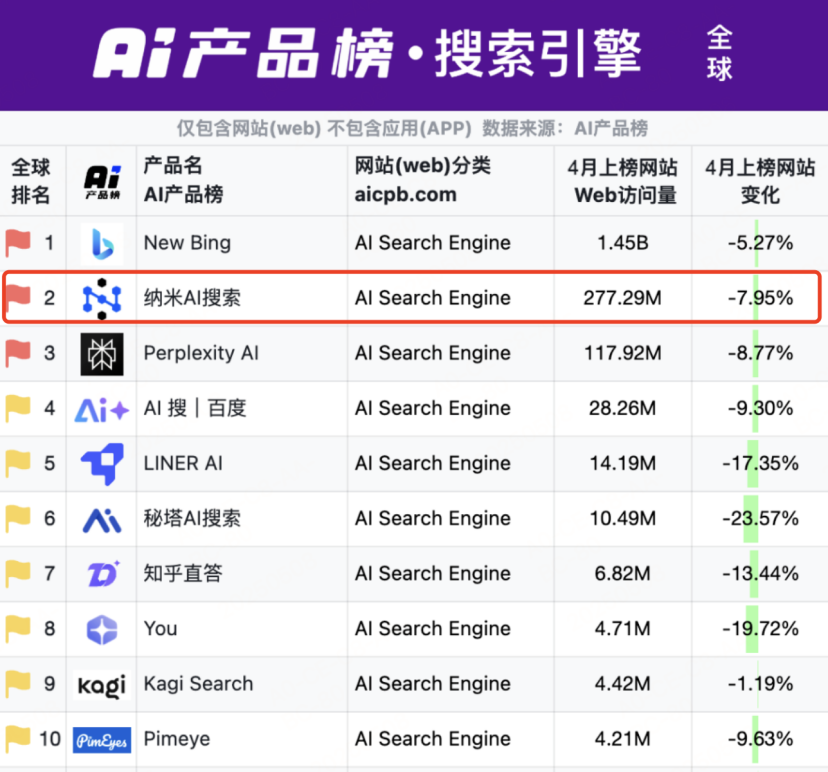
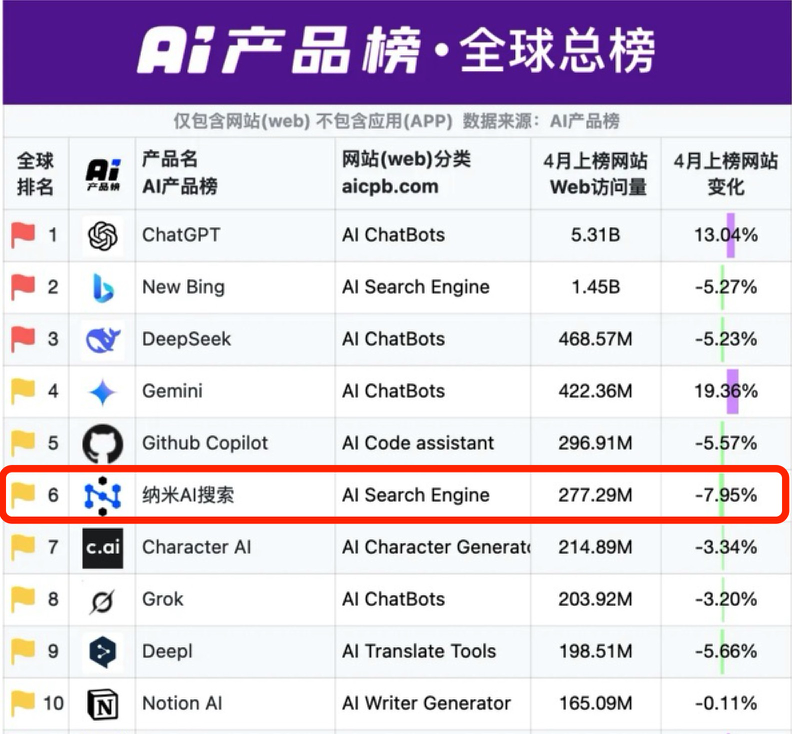
How did Nano AI become the leader in domestic AI search?
From 'Giving You Answers' to 'Helping You Get It Done'
If traditional search engines centered on internet retrieval and ranking algorithms are considered the first generation of search, AI search incorporating large model deep thinking capabilities in recent years can be called the second generation.
However, the second generation of search is far from intelligent. Most AI search products on the market simply integrate large model question-answering capabilities with traditional search, providing a user experience hardly distinguishable from a simple ChatBot. At its core, it still follows the logic of traditional search engines – providing users with sufficiently accurate and detailed information, with AI first helping users filter and summarize.
Nano AI Search and Google's AI Mode, however, aim to achieve a leap from 'giving you information' to 'helping you get it done,' both targeting search that not only provides information but also directly fulfills user needs.
Given that Google's AI Mode is currently only available in the United States, let's use Nano AI Search, which is earlier implemented and closer to national conditions, for demonstration.
Upon opening Nano AI Super Search, in addition to the common search box found in AI search engines, Nano AI Search also provides recommended task cases covering industry research reports, stock analysis, travel guides, and even hot search compilations and writing hits on social media platforms like Xiaohongshu at the bottom of the page. Below the large text 'Nano AI Super Search,' a small line of text explains, 'A super search agent with independent thinking, task planning, and execution capabilities, providing better search results and experiences.'
Since it's currently the 618 shopping festival, let's directly conduct a shopping test to see if it can complete a home appliance purchase.
Requirements are as follows:
I want to buy a TV around 8,000 yuan. The elevator at home can only fit a 2.1-meter outer packaging. Please help me see which TV has the best effect for watching movies at home. I have independent speakers, so I don't need good sound quality, but I need high brightness, high contrast, good HDR effects, and a wide color gamut. Please help me compile links for 3 products within my price range and recommend the one with the fewest negative reviews to me.
Traditional search engines or AI searches that simply incorporate large model thinking capabilities can often only provide broad purchasing suggestions when faced with such complex and lengthy requirements. For example, the following two answers are selected from two other AI search products.
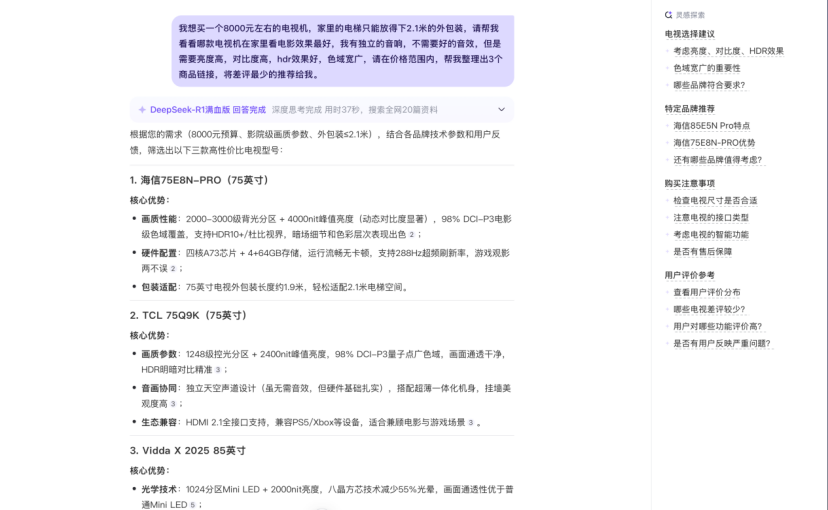
AI Search A
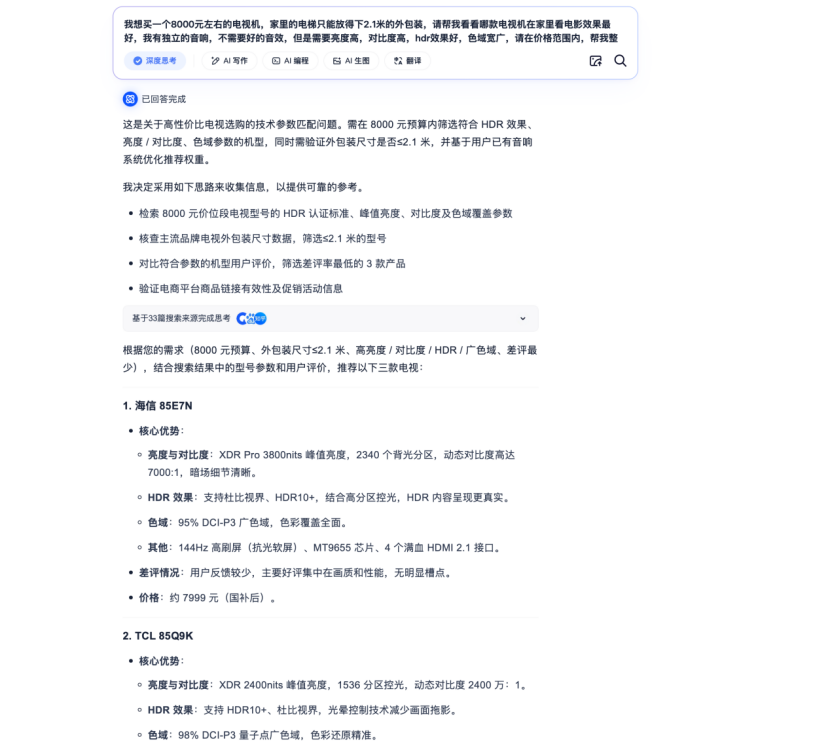
AI Search B
As can be seen, AI searches that simply incorporate large model thinking capabilities do not deviate from the paradigm of traditional search engines and still only provide information to users. They do not connect with e-commerce platforms and cannot provide direct product information, still requiring users to further think, organize, and visit various e-commerce platforms.
Nano AI Super Search, however, provides a completely different search experience. Without further ado, here is the finished product:
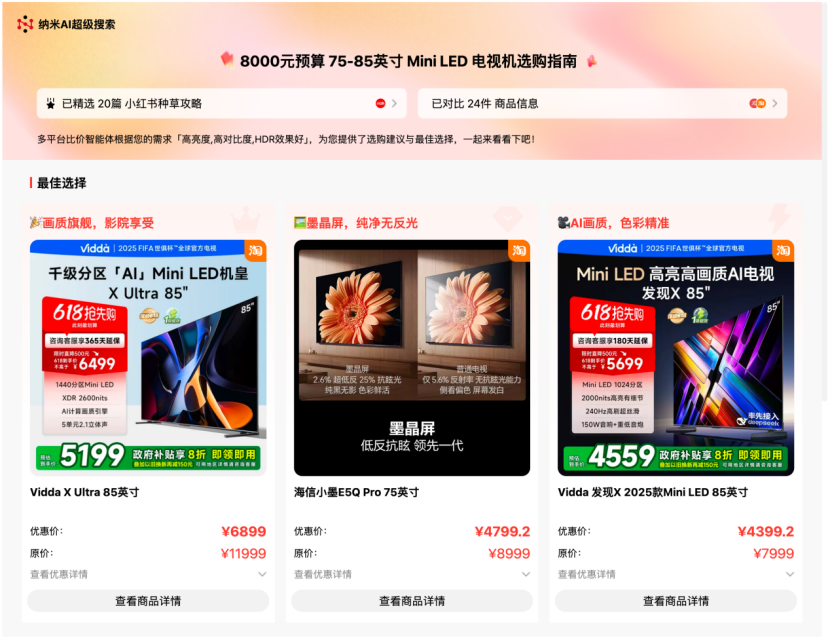
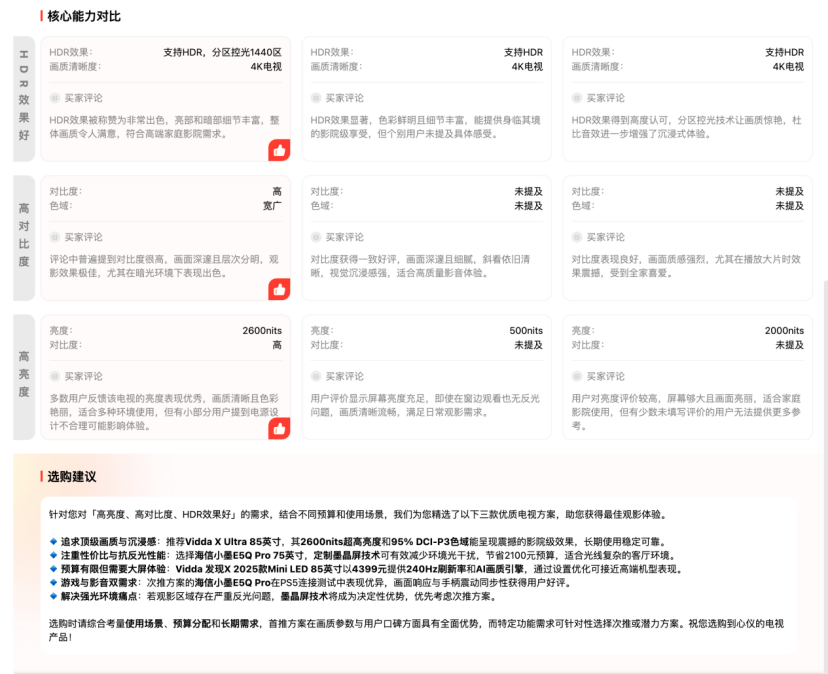
Unlike other AI search engines that merely provide a text suggestion, Nano AI Search directly generates a shopping guide with both images and text, not only listing product images, core features, buyer reviews, and even the latest discounted prices and product links in detail, but it also generates a preview website for users to share intuitively: https://hr439i.n.cn
Upon carefully reviewing the processing of Nano AI Search, it does not simply rely on the deep thinking capabilities and internet search functions of models like other AI searches, but is an agent capable of independent thinking, planning, and execution.
For example, in this request, Nano AI Search first calls the MCP tool 'Nano AI | Disassemble Requirements' to divide the user's complex requirements into multiple segmented purchasing needs. Then, it calls the MCP tool 'Nano AI | Search Xiaohongshu' to focus on searching for real notes on Xiaohongshu that meet user needs.
After analyzing the purchasing strategies, instead of searching for textual information on web pages like traditional AI searches, Nano AI Search directly opens e-commerce websites such as Taobao and JD.com using a local browser and begins real-time price comparisons on these sites.
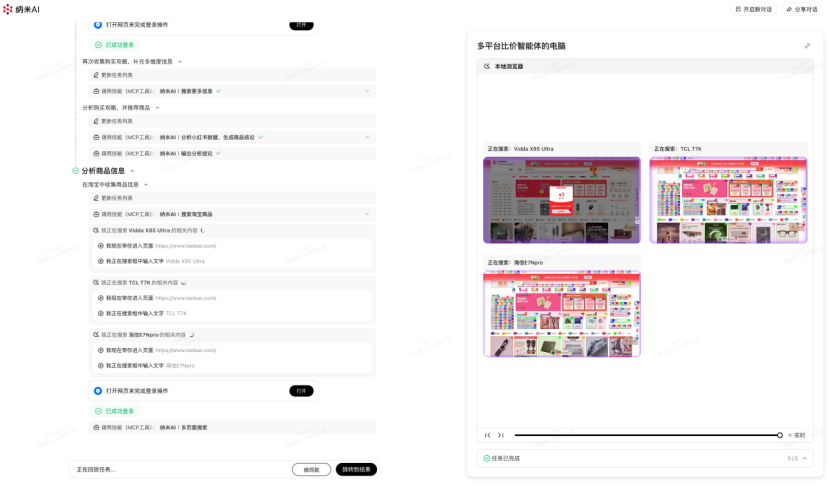
Nano AI Search Processing Task
From the implementation preview window on the right, it can be seen that Nano AI Search can not only read text information on web pages but also capture product images, information, prices, and even user reviews on e-commerce websites, and even understand video sharing on Xiaohongshu.
More crucially, these actions do not require human intervention, and the entire task flow is autonomously completed by Nano AI by automatically calling various MCP tools, multimodal recognition capabilities, and various vertical models in the background.
After browsing Taobao, JD.com, and other e-commerce websites and comparing product prices and user reviews, Nano AI will ultimately generate a visual shopping guide and can even help you add items to your shopping cart with one click – this is almost indistinguishable from the AI Mode functionality demonstrated by Google at the I/O developer conference.
At the I/O developer conference, Google also demonstrated the intelligent agent function of 'AI getting things done for you.' Simply by proposing requirements such as ticket booking and meal ordering, AI search can directly search ticket booking websites in the background, automatically search, compare, and analyze, and ultimately complete the task directly.
To some extent, it is already difficult to describe the AI search functions displayed by Nano AI Search and Google using the term 'search.' They have deviated from the concept of 'search' and have become super agents that directly deliver results.
This 618, you might really want to try letting AI do your legwork.
What Did Nano AI Do Right?
For a long time, 360 has not been the most watched company in the AI market, and Nano AI Search has only been launched for half a year. With established search giants like Baidu in front and AI newcomers like Quark behind, why is it that 360 was the first to initiate the revolution in AI search, even surpassing search giant Google?
In the face of new technology and product opportunities like large models, everyone is essentially starting on the same line. Especially in the field of AI search, product capability and model capability are equally important, and the former is even more important than the latter. However, due to the burden of traditional search engine business models, whether domestic or overseas, giants are often not the most aggressive in the shift to AI search.
Similar to Microsoft, which is more aggressive in exploring AI search overseas, 360, the 'eternal runner-up' in the domestic search market, similarly has no burden or constraints in the face of the AI transformation tide and is not restricted by its own mobile products, allowing it to refine products from a purely To C perspective, with product iterations focused on exploring user needs and existing large model products to achieve PMF.
Nano AI Search was officially launched in November last year, but in just six months, it has been a pioneer in various areas, including completing multimodal fusion question-answering (such as the full-blooded version of DeepSeek during the Spring Festival), earlier introducing the knowledge base of the second brain, or the recent addition of agents and MCP tools, and surpassing Deep Research's super search. The rapid iteration speed of Nano AI is quite rare in the entire AI field.
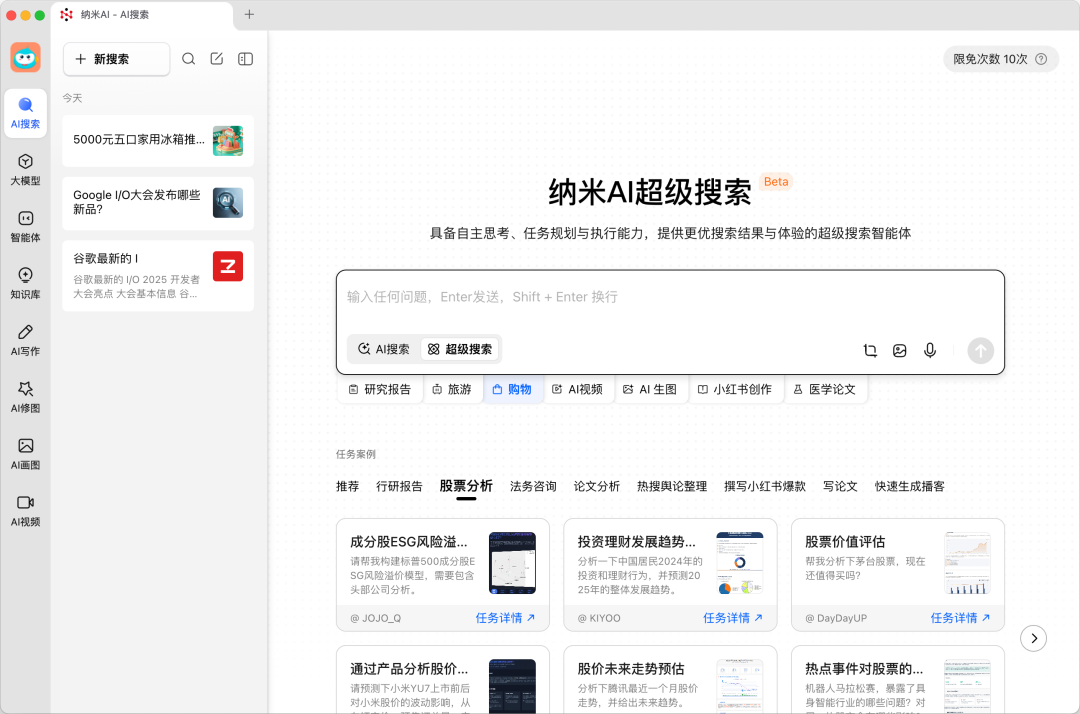
Nano AI Search
The real-time reading of Xiaohongshu notes, autonomous search of e-commerce websites for price comparisons, reading of textual reviews, and even video sharing demonstrated above are all supported by this set of MCP tools and multimodal fusion recognition.
This is not easy. Since the mobile internet era, China's content ecosystem has gradually become fragmented, with each vertical community tending to retain content on its own platform and refusing to open it to the outside world. A notable example is that multiple content platforms restrict the permissions of non-logged-in users, forcing them to log in to view community content. Not only can traditional search engines not capture data from vertical content communities, but AI searches are often powerless as well.
However, in the era of AI search, vertical content communities have surpassed information portals to become one of the most important sources of information. A recent report on the transformation of SEO strategies for AI intelligent assistants released by QuantumBit Intelligence points out that nearly half of AI answers are sourced from content communities, especially in professional topics, where the citation weight of content communities is higher, exceeding 60%.
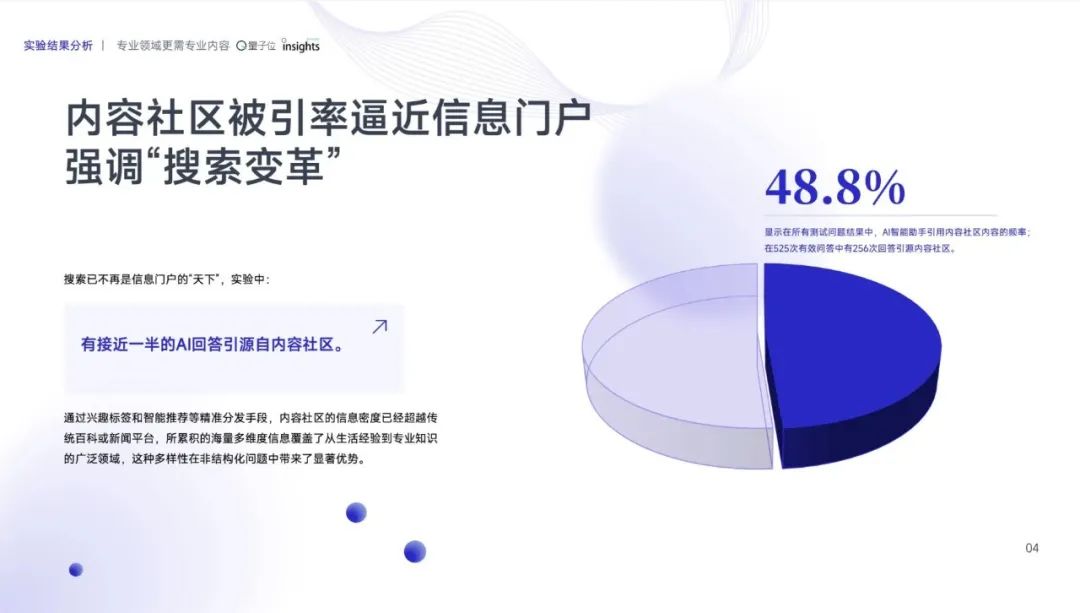
Research report released by QuantumBit Intelligence
The question arises, why can Nano AI Search still break through content walls and directly capture high-quality content scattered across different platforms and communities without logging in?
There are two reasons. First, Nano AI Search does not directly call browser use in the cloud and use open-source Chromium like other AI search tools. Most AI browsers based on browser use are not inherently designed to serve large models and cannot achieve autonomous login and autonomous completion of human-machine verification.
Thanks to its past accumulation of capabilities at the browser's underlying level, 360 has specifically built a browser dedicated to large models, enabling large model calls to run entirely on local computers, breaking through content walls and content fences, and avoiding the frequent need for users to scan QR codes to log in.
But it's not enough for AI to just 'see'; it also needs to 'understand.' According to 360, they have built an AI crawler tool that is best suited to China's internet characteristics. Unlike general crawlers, the crawler tool specifically built by Nano AI for large models can understand various complex page structures, including dynamic web page codes of different websites such as information flow websites, video websites, and social networking sites, successfully extracting web text, images, videos, and audio.
But more crucially, it's the courage of 360 to go all in as the AI search wave approaches. Instead of leveraging the user advantage and market position accumulated by its traditional search engine like other search companies, this company chose to rebuild from scratch and establish a brand-new AI search brand.
AI Search Also Needs to Prioritize Security
Even though AI search has seen explosive growth globally over the past two years, with user numbers hitting new highs, the issue of hallucinations in AI search has also raised market concerns.
The Tow Center for Digital Journalism at Columbia Journalism School recently undertook a study examining the accuracy of AI search citations, evaluating eight AI search tools including ChatGPT Search, Perplexity, and Perplexity Pro. The findings unveiled a concerning trend: these AI search tools exhibited poor performance in citing news, with error rates soaring as high as 60%.
Hallucinations, a persistent criticism of generative AI, paradoxically represent a strength of traditional search engines.
Nano AI has devised a dual-pronged approach, encompassing both public and private domain searches. For public domain knowledge, Nano AI leverages 360's extensive search experience, establishing an index library with hundreds of billions of entries and a high-quality subset of tens of billions of entries. This robust infrastructure significantly minimizes hallucination occurrences. Additionally, Nano AI integrates premium and specialized data sources like Avily Search, Exa Search, Github, Google Scholar, and ArXiv across academia, medicine, science, and coding, thereby ensuring the authenticity of information at its source.
For private domain knowledge, Nano AI introduces a knowledge base function akin to a secondary brain. Users can import local professional knowledge files into Nano Search, which subsequently learns and indexes this local knowledge base. This fusion of "public network information + private memories" enhances the accuracy and comprehensiveness of search results.
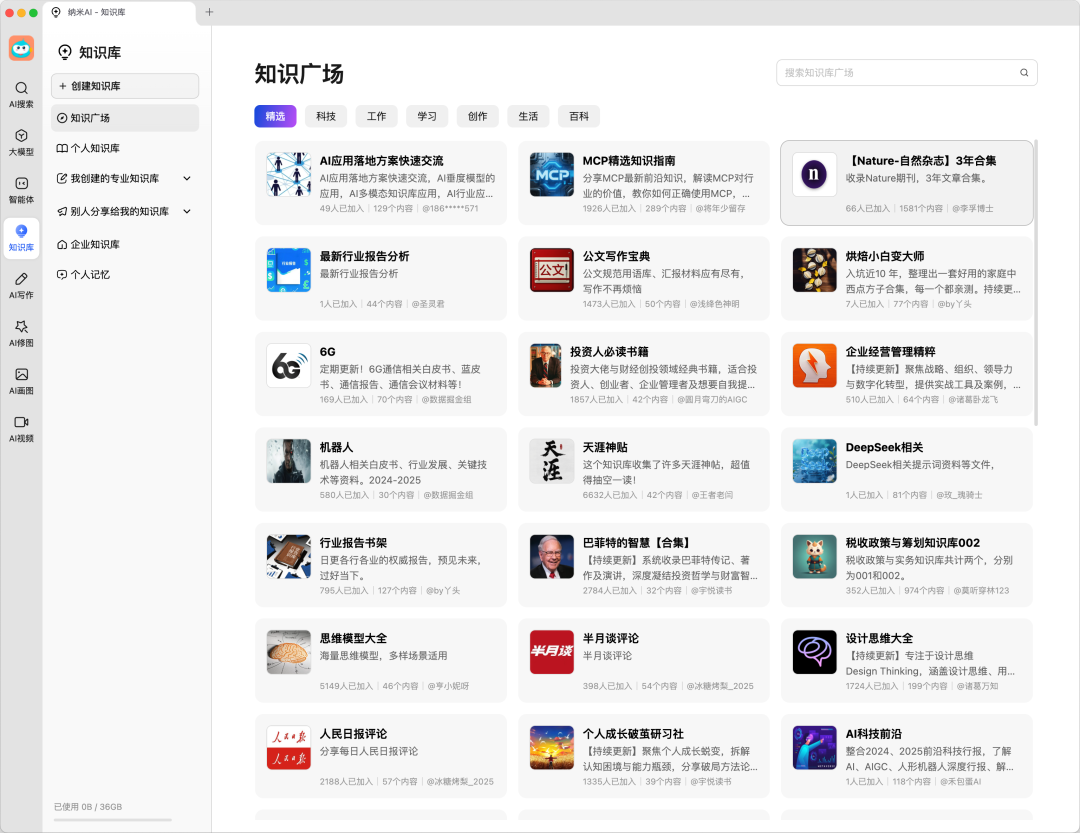
Nano AI Search's knowledge base facilitates user sharing.
To safeguard the security of the local MCP client, 360 has pioneered the integration of an isolated sandbox MCP function. This feature enables real-time monitoring, warning, and restriction of the MCP client's local computer operations, giving users the confidence to allow large models to generate locally executed instructions without the fear of data loss, information leakage, or high-risk operations stemming from hallucinations, errors, or malicious injection attacks.
Since its official launch of search functionality in 2012, 360 has been refining its search capabilities for over a decade. Perhaps surprisingly, 360 stands as a hidden giant within the domestic browser industry. Among China's top three browsers, alongside Microsoft's Edge and Google's Chrome, 360 Safe Browser holds a prominent position.
These decades-long efforts centered around search have culminated in the era of large models. The AI search landscape is still in its nascent stages, with the ultimate form of AI products yet to be determined. Nevertheless, in this fiercely competitive sprint for positioning, domestic AI companies have seized the initiative.
© All rights reserved by Shanshang. Unauthorized reproduction is prohibited.







